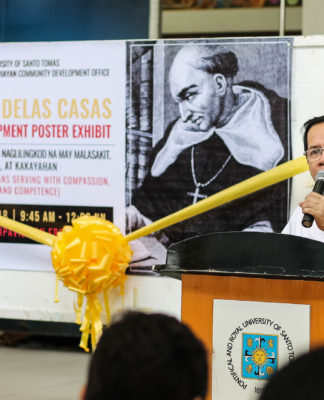THE UNIVERSITY administration and the 1,600-strong UST Faculty Union (USTFU) finally signed a new, five-year collective bargaining agreement (CBA) last March 10, with both sides agreeing to a “compromise” to avert a strike.
The deal came less than a month after USTFU declared a deadlock in negotiations over teaching loads, faculty qualifications and promotion, which became the basis for the filing of a notice of strike before the National Conciliation and Mediation Board last Feb. 27.
Faculty members ratified the 2011-2016 CBA detailing terms and conditions of work last March 18, paving the way for salary increases and other economic benefits. The secret ballot at the Medicine Auditorium yielded overwhelming approval, with 1,368 faculty members voting “yes” to the new CBA that will also allow the distribution of three years’ worth of backpay.
Out of 1,549 registered voters, only 157 voted “no,” while 24 votes were declared spoiled or invalid by the USTFU Commission on Elections. Classes were suspended until 12 noon to allow USTFU officials to discuss the long-delayed CBA in a general assembly and field questions from faculty members.
Salaries for general faculty will go up by 3 percent to 19 percent. The new CBA also provided for salary hikes for high school teachers, guidance counselors, and librarians. Union officials said economic benefits would be distributed on or before March 31, including a signing bonus of up to P15,000.
The Rector also agreed to grant an extra P7,500 “goodwill bonus” to tenured faculty upon approval by the Academic Senate, the Varsitarian has learned.
Backdoor talks
Carillo said the “compromise” stemmed from backdoor talks between the two parties with Rector Fr. Herminio Dagohoy, O.P.
“We just continued with the deferred provisions,” Carillo told the Varsitarian in an interview. “Those [provisions] were discussed in the last three days when the USTFU made a presentation to the Rector.”
The signing was more of a “rundown” of what the panels had already resolved, she added. “Both panels have the interest of the faculty in mind. I think it’s a good thing if we can resolve this peacefully. After all, we belong to one Thomasian family.”
The new CBA came after 34 formal negotiations that lasted for almost a year, and several backdoor talks with the Rector. USTFU had filed a notice of strike with the Labor department’s conciliation and mediation board after declaring a deadlock in talks last Feb. 14.
The administration got its way with a point-based system of distributing contested teaching loads, while agreeing to increase the weight for research and creative works to only 17.5 percent instead of 25 percent, from the original 12.5 percent under the faculty promotion and classification scheme. USTFU had sought two successive three-unit reductions in the 24-unit full-time faculty load without salary cuts in exchange for doubling the weight. The union had also insisted on retaining seniority as the basis of load distribution.
In the final CBA, the full-time load will be reduced by three units to 21 units without salary cuts, on a staggered basis starting with full professors effective Academic Year (AY) 2014-2015. The new full-time load will apply to all instructors in AY 2017-2018. In exchange for the three-unit reduction, faculty members will be given other assignments such as consultation and committee work, among others.
Other economic benefits, which include Christmas, clothing, laundry, anniversary, and birthday bonuses; meal allowance; rice in kind and in cash; and annual distribution of goods based on years of service in the University, will retroact to June 2011.
USTFU President George Lim, head of the union’s negotiating panel, admitted that the union had to give up some of its demands. “[It’s a] negotiation. The University offered us a nice package. In return, there were some items we had to compromise,” he said.
But USTFU Internal Vice President Rene Tadle said things could have been better.
“As a member of the panel, I have to consider the pressing needs of the faculty members. Thus, I have to sign, while knowing fully well that things could have been improved,” Tadle said in an interview.
Both parties were to make a joint manifestation before the Department of Labor and Employment to withdraw the notice of strike, according to Tadle.
Transparency
The University vowed to uphold transparency in the new CBA. Section 6 of the new CBA's miscellaneous provisions require UST to furnish the faculty union, three months upon request, copies of its annual audited financial statements, a breakdown of tuition collection and expenses, an accounting of tuition increases and National Student Training Program funds, the number of students and their respective units per college, and the number of faculty members' teaching loads per college.
In its notice of strike last month, USTFU accused the University of unfair labor practice for failing to provide annual audited financial statements, a requirement in collective bargaining under the Labor Code.
Under the new CBA, UST shall not diminish existing benefits, even those not stated in the new CBA but previously extended by the University to faculty members. Diminution of benefits is prohibited under the Labor Code.
Faculty members who have completed their doctorate degrees may undergo review for promotion outside the biennial promotion cycle, but will not be eligible in the succeeding promotion year. New provisions on promotion and reclassification will not be applicable to faculty members set to be promoted in 2016.
Swift approval
Lawyer Danielito Jimenez, a professor from the Faculty of Arts and Letters, expressed dismay over what he claimed was the “swift” signing of the CBA. “[N]alulungkot ako sa turnout ng CBA kasi it appeared [that] we could have gotten more, dahil ang nangyari dito, parang mabilisan [ang signing],” Jimenez told the Varsitarian. “So, I hope in the future negotiations, there will be a better way of negotiating, there will be transparency.”
But Revenendo Vargas, member of the USTFU panel and the USTFU board, said there was no such thing as a “perfect” CBA.
“Mayroong mga flaws, pero walang perfect CBA. ‘Pag na-ratify ito, sabay-sabay nating ii-implement ito para mas maayos. Walang perfect na CBA, [tayong faculty members] ang magpe-perfect [nito],” he said.
Before the faculty ratification last March 18, Artlets professor Reynaldo Reyes accused Lim, Carillo and the Rector of negotiating “in bad faith,” and called on faculty members not to ratify the CBA.
In a March 11 letter to faculty members, Reyes claimed Dagohoy had invited Lim to his office for backdoor talks, which were actually negotiations.
“The union president agreed to negotiate outside the regular panels’ meetings [which] was concluded just after three days. [W]hen regular negotiation resumed last March 10, it was [to sign] the new CBA,” Reyes said, adding that the negotiations were done without the approval of the union board or its legal counsel.
He claimed that ratification would be in bad faith because of Lim’s statement that all economic benefits would be distributed in late March after CBA ratification.
“He means economic benefits, due us since 2011, shall be given to us with the condition to ratify first the new CBA. Does it mean if it is not ratified, the long overdue [tuition increase] share would not be given to us?” Reyes said in his letter.
He also claimed Lim had told faculty club presidents in a meeting last March 12 that faculty members who would vote against the new CBA would not receive the signing bonus—a move that majority of the faculty club presidents rejected.
“[Faculty members] all deserve better. We deserve better leadership—a strongly committed, honest, transparent union. Most of all, we deserve a better CBA. We deserve, still, the [2006-2011 CBA],” said Reyes.
In a letter to Vice Rector for Finance Fr. Manuel Roux, O.P. last Feb. 28, USTFU asked the administration to distribute the 70-percent share of, and corresponding interest on, tuition increases for academic years 2011-2012, 2012-2013, and 2013-2014 to faculty members.
Republic Act 6728, or the Government Assistance to Students and Teachers in Private Education Act, states that 70 percent of tuition increases should go to faculty and support staff, 20 percent to maintenance of facilities, and 10 percent to return of investment.
Support staff under the Samahang Manggagawa ng UST received their share of the tuition increase last year following the ratification of their CBA with the University in August 2013.
Carillo said a new CBA was needed as it would be the basis for distributing the 70 percent share in tuition increase among non-academic personnel, faculty members, and administrative officials.
“The share of the faculty cannot be released as there has been no agreement yet that supports how it will be spent. It is a ratified CBA that will inform and authorize management to allot a percentage of the tuition fee increase share for salary adjustments, how much adjustment will be made per rank, and what amount shall be set aside for additional or upgraded benefits,” Carillo said in a letter to administrative and academic officials dated February 26.

















